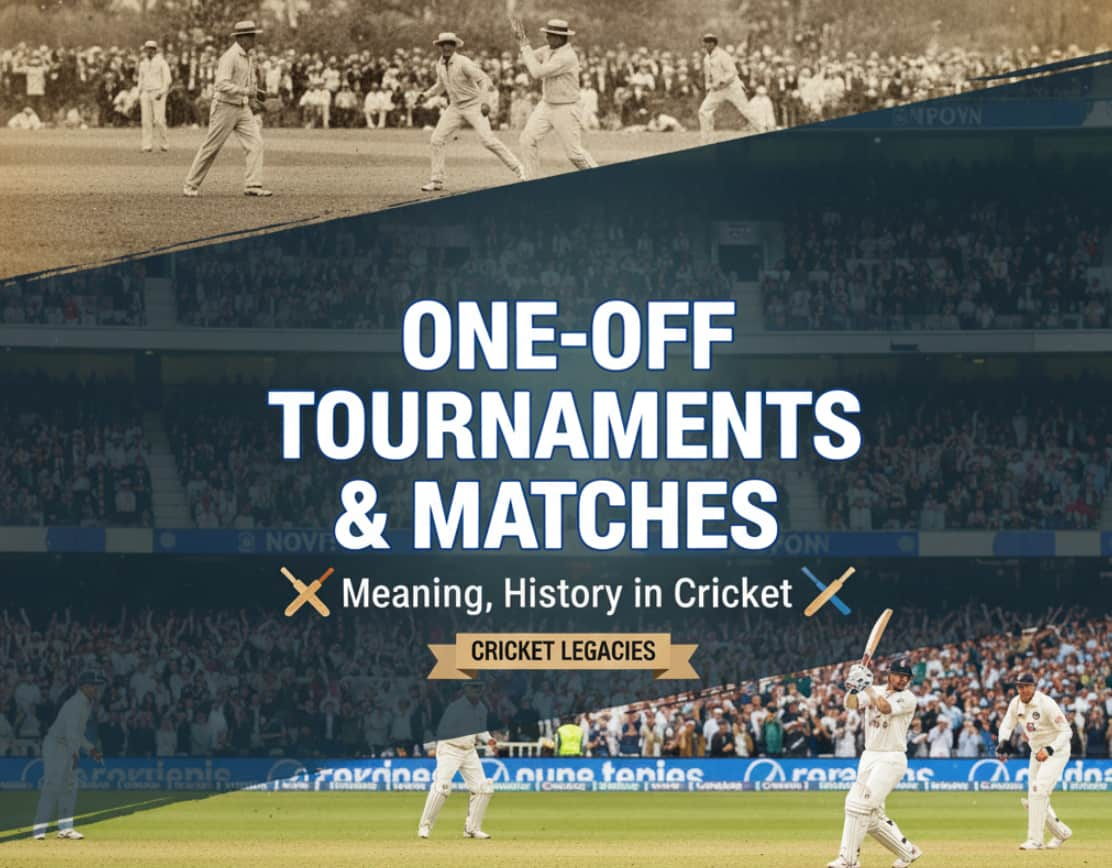Cricket is a sport filled with long series and multiple matches. But sometimes, everything comes down to just one single game.
These special contests are called one-off matches or One-Off Tournaments.
When you see a cricket fixture that happens only once, without any follow-up games, you’re looking at a one-off match.
These games carry extra weight because there’s no second chance. Win or lose, that’s it. The pressure is real, the stakes are high, and every ball matters more than usual.
One-off matches appear in different forms across cricket. You might see a single Test match between two countries, a stand-alone ODI, or a special T20 game.
Unlike regular tours where teams play multiple games, these contests are final from the very first delivery.
Fans often get excited about these rare fixtures because they feel different from normal cricket. Players approach them with extra intensity.
Captains plan more carefully. And supporters remember them for years to come.
From Afghanistan’s historic Test debut to the unforgettable 2019 World Cup Final, one-off contests have given cricket some of its most memorable moments.
One-Off Tournaments & Matches

Understanding what makes these games special helps you appreciate why they hold such a unique place in cricket history.
What Does “One-Off Tournament” Mean in Cricket?
A one-off tournament means a cricket competition that happens only once, without multiple rounds or games. Think of it as a single decisive contest where everything is settled in one match.
Here’s what you’ll typically see in One-Off Tournaments:
- Single Test Match: Two teams play just one Test instead of a 2, 3, or 5-match series
- Stand-alone ODI: A limited-overs international that isn’t part of a larger tour
- Independent T20I: A Twenty20 international played as a separate fixture
- Special Event Match: Games organized for charity, tributes, or commemorations
| Match Type | Normal Format | One-Off Format |
|---|---|---|
| Test Cricket | 2-5 match series | Single Test match |
| ODI Cricket | 3-7 match series | Single ODI |
| T20 Cricket | 2-5 match series | Single T20I |
The key difference is simple: regular cricket gives teams multiple chances to prove themselves. One-off matches give them just one opportunity.
These contests still carry full international status when approved by the ICC. Player statistics count, team rankings get affected, and career milestones can be achieved. The only difference is the format and the pressure that comes with it.
Difference Between One-Off Matches and Series
Understanding the difference between one-off matches and series helps explain why these single games feel so intense.
Series Cricket:
- Teams play multiple matches (usually 2-5 games)
- Bad performance in one match can be recovered in the next
- Consistency over several games determines the winner
- Players have time to adjust and improve
- Less pressure on individual performances
One-Off Matches:
- Everything depends on a single game
- No opportunity to bounce back from mistakes
- One bad day can cost the entire contest
- Maximum pressure on every player
- More memorable and talked about
| Aspect | Series | One-Off Match |
|---|---|---|
| Number of Games | 2-5 matches | 1 match only |
| Recovery Chance | Yes | No |
| Pressure Level | Moderate | Very High |
| Preparation Time | Spread across tour | Focused on one game |
| Fan Interest | Gradual build-up | Immediate excitement |
This difference makes one-off matches more unpredictable and often more exciting for fans. The stronger team doesn’t always win because cricket can be decided by small moments.
Origin of the Term in Cricket
The phrase “one-off” simply means “happening only once”. It entered cricket vocabulary as the sport grew worldwide and scheduling became more complex.
In early cricket history, most international matches were one-off contests. Countries didn’t have the resources or time for long tours. As cricket became more organized, series became common, making single matches feel special again.
The term became popular when:
- New cricket nations needed single matches to gain Test status
- Busy schedules forced boards to fit in only one game
- ICC expansion brought more countries into international cricket
- Special occasions required commemorative matches
Today, when cricket commentators or fans use “one-off,” everyone understands it means a standalone contest that won’t be repeated immediately.
Why Are One-Off Matches Organized in Cricket?
Cricket boards don’t schedule one-off matches randomly. These games serve specific purposes that regular series can’t fulfill.
Main Reasons for One-Off Matches:
- Tight International Schedules
- Modern cricket calendars are packed
- Teams can only spare time for one match
- Fitting in a full series becomes impossible
- Historic or Commemorative Events
- Stadium inaugurations
- Cricket board anniversaries
- Milestone celebrations (like 100th Test)
- Memorial matches for legendary players
- Budget and Logistics
- Smaller cricket boards can’t afford long tours
- Limited resources for hosting multiple matches
- Easier organization for developing nations
- Testing New Teams
- ICC uses one-off matches to introduce new Test nations
- Gives debut countries international exposure
- Helps assess readiness for regular cricket
- Farewell and Tribute Matches
- Honoring retiring cricketers
- Special games for cricket legends
- Charity fundraising events
Each reason creates matches that fans remember differently from regular series cricket.
One-Off Test Matches in Cricket
One-off Test matches represent the most prestigious form of single-game cricket. These are full five-day contests with complete international status, but they stand alone without being part of a series.
Characteristics of One-Off Tests:
- Full ICC recognition and status
- Count toward official team rankings
- Player performances affect career statistics
- Same rules and format as series Tests
- Often carries extra historical significance
Famous One-Off Test Examples:
| Teams | Year | Venue | Significance |
|---|---|---|---|
| India vs Bangladesh | 2015 | Fatullah | Bangladesh’s 100th Test |
| Afghanistan vs India | 2018 | Bengaluru | Afghanistan’s first Test |
| Ireland vs Pakistan | 2018 | Dublin | Ireland’s Test debut |
These matches prove that quality matters more than quantity. Afghanistan’s first Test lasted only two days, but it marked a huge milestone for their cricket development.
Players often approach one-off Tests with mixed feelings. The pressure is intense because there’s no chance to make up for poor performance in the next match. Captains must balance aggression with caution, knowing that one tactical mistake could cost everything.
Impact on Players and Rankings
One-off matches affect cricket in the same way as series matches, but the psychological impact is often greater.
Player Impact:
- Career-defining performances become more likely
- Single bad games can overshadow good records
- Mental strength becomes crucial
- Preparation must be perfect from day one
- No time to settle into a rhythm across multiple matches
Rankings Impact:
- ICC team rankings change based on results
- Individual player statistics get updated
- World Test Championship points are awarded (for Tests)
- Same weightage as series matches in official records
Why Players Find Them Challenging:
- No warm-up period to get used to conditions
- Maximum pressure from the first ball
- Media attention is often more intense
- Fans expect special performances
- Career milestones might depend on a single game
For young players, performing well in a one-off match can launch their careers. For experienced players, these games often become legacy-defining moments.
One-Off ODIs and T20Is
Limited-overs one-off matches are more common than Test matches and serve different purposes in modern cricket.
One-Off ODIs
One-off ODIs happen regularly in international cricket, often during short tours or special events.
Common Types of One-Off ODIs:
- Commemorative Matches: Celebrating cricket milestones
- Charity Games: Raising funds for good causes
- World XI Contests: Special teams vs national sides
- Tournament Finals: Deciding champions in one game
Notable One-Off ODI Examples:
| Match | Year | Venue | Special Feature |
|---|---|---|---|
| World XI vs Australia | 2005 | Melbourne | ICC Super Series special |
| Various charity matches | Multiple years | Various | Fundraising events |
| Tournament finals | Annually | Various | Single-game deciders |
The 2019 ODI World Cup Final between England and New Zealand is the most famous one-off ODI ever played. The match tied, the Super Over tied, and England won on boundary countback. Fans still talk about this game as the greatest ODI in history.
One-Off T20Is
T20 one-off matches often serve as crowd-pleasers and are easier to organize than longer formats.
Characteristics of One-Off T20Is:
- Quick entertainment for fans
- Easy to fit into busy schedules
- Perfect for special occasions
- Less financial burden on organizers
- High entertainment value
Popular One-Off T20I Situations:
- New format testing (when T20 cricket was starting)
- Celebrity charity matches
- Stadium opening ceremonies
- Cricket festival events
- International friendship matches
The first-ever T20I between Australia and South Africa in 2006 was a one-off match that helped establish the format’s popularity worldwide.
Famous One-Off Matches in Cricket History
Some one-off contests have become legendary in cricket folklore, remembered for their significance, drama, or historical importance.
Most Memorable One-Off Matches:
Afghanistan vs India (2018) – Bengaluru Test
- Afghanistan’s first-ever Test match
- India won in just two days
- Historic moment for Afghan cricket
- Showed the gap between established and new Test nations
India vs Bangladesh (2015) – Fatullah Test
- Bangladesh’s 100th Test milestone
- The rain affected most of the match
- Ended in a draw, but was historically significant
- Celebrated Bangladesh’s cricket journey
England vs New Zealand (2019) – World Cup Final
- Greatest ODI ever played, according to many
- Match tied, Super Over tied
- England won on boundary countback
- Most dramatic finish in cricket history
World XI vs Australia (2005) – ICC Super Series ODI
- Star-studded World XI team
- Played in Melbourne with a huge crowd
- Australia dominated the contest
- Rare opportunity to see the world’s best together
| Match | Format | Key Feature | Result |
|---|---|---|---|
| Afghanistan vs India 2018 | Test | First Afghan Test | India won |
| England vs NZ 2019 | ODI | World Cup Final | England won |
| World XI vs Australia 2005 | ODI | Special team | Australia won |
These matches prove that one-off contests can create lasting memories that series sometimes can’t match.
Player & Team Perspectives on One-Off Matches
From a player’s viewpoint, one-off matches present unique mental and tactical challenges that require different preparation.
Player Challenges:
- Mental Pressure: No second chance to make up for mistakes
- Preparation Intensity: Must be 100% ready from day one
- Strategy Decisions: Captains must balance risk and reward carefully
- Performance Anxiety: Every action gets magnified
- Historical Weight: Knowing the match might be remembered forever
Team Management Approach:
- Focus on mental conditioning
- Perfect preparation in a limited time
- Bold tactical decisions
- Squad selection becomes crucial
- Managing player expectations
Captain’s Dilemma: Most captains approach one-off matches with aggressive caution. They want to win but can’t afford to lose wickets cheaply or set unrealistic targets.
Player Quotes and Reactions: Many cricketers have mentioned that one-off matches feel different. The dressing room atmosphere is more tense, team talks are more focused, and every player knows their individual performance could determine the outcome.
What Players Love About One-Off Matches:
- Career-defining moment opportunities
- Maximum crowd attention
- Historical significance
- Testing mental strength
- Immediate result satisfaction
What Players Find Difficult:
- Intense media scrutiny
- No room for off-days
- Limited time to adapt to conditions
- Pressure to deliver immediately
Advantages and Disadvantages of One-Off Matches in Cricket
Like every format in cricket, one-off matches bring both benefits and challenges to the sport.
Advantages
For Cricket Boards:
- Time Efficiency: Fits into busy international calendars
- Cost Effective: Cheaper to organize than a full series
- Special Events: Perfect for commemorations and milestones
- TV Revenue: High viewership due to one-game excitement
- Flexibility: Easy to schedule during gaps
For Fans:
- High Stakes Drama: Every ball matters more
- Memorable Moments: Games are often talked about for years
- Accessibility: Easier to follow one match than the entire series
- Special Atmosphere: A Unique feeling in stadiums
- Historical Significance: Often witness to cricket milestones
For Players:
- Career Opportunities: Single performances can change careers
- Mental Challenge: Tests psychological strength
- Legacy Building: Chance to create lasting memories
- Focused Preparation: Clear single-game target
Disadvantages
Competitive Fairness Issues:
- No Recovery Chance: One bad day can overshadow years of good cricket
- Weather Impact: Rain or bad conditions affect the entire contest
- Pitch Lottery: Unusual pitches can determine unfair outcomes
- Form Fluctuations: Teams might not be at their best on that specific day
Development Concerns:
- Limited Exposure: New teams get minimal international experience
- Pressure Overload: Young players might struggle with intensity
- Tactical Limitations: No time to adjust strategies mid-series
- Skill Assessment: Hard to judge team strength from a single game
| Aspect | Advantages | Disadvantages |
|---|---|---|
| Fairness | High stakes excitement | No second chances |
| Development | Focused preparation | Limited exposure |
| Entertainment | Memorable moments | Weather dependencies |
| Resources | Cost effective | Pressure overload |
Series vs One-Off Comparison
Understanding how series and one-off matches differ helps appreciate why both formats exist in modern cricket.
Series Benefits:
- Shows team consistency over multiple games
- Allows tactical adjustments between matches
- Provides more entertainment value over time
- Gives players chances to redeem poor performances
- Better assessment of team strength
One-Off Benefits:
- Tests mental strength under ultimate pressure
- Creates historic moments more easily
- Fits busy schedules better
- Generates immediate excitement
- Perfect for special occasions
When Each Format Works Best:
| Situation | Better Format | Reason |
|---|---|---|
| Regular bilateral tours | Series | Comprehensive cricket |
| Historic milestones | One-off | Special significance |
| Busy calendar periods | One-off | Time constraints |
| New team introductions | One-off | Manageable exposure |
| Championship deciders | One-off | Ultimate pressure test |
Both formats serve cricket well, but one-off matches create those unforgettable moments that fans cherish for decades.
FAQs About One-Off Matches in Cricket
- What is a one-off Test match in cricket?
A one-off Test is a single Test match between two teams that isn’t part of a larger series. It carries full international status and counts toward rankings and player statistics.
- Do one-off matches count for official rankings?
Yes, all ICC-approved one-off matches affect team rankings and player statistics exactly like series matches do.
- Why do cricket boards schedule one-off matches?
Main reasons include tight schedules, commemorative events, budget constraints, testing new teams, and organizing tribute matches for retiring players.
- Are one-off matches more exciting than series?
Many fans find them more exciting because of the high stakes and no second chances. Every ball carries more weight than in series cricket.
- Which was the most famous one-off match ever?
The 2019 ODI World Cup Final between England and New Zealand is widely considered the greatest one-off match, ending in a dramatic tie-breaker.
- Do players prefer one-off matches or series?
Most players enjoy the mental challenge but find the pressure intense. Opinions vary based on personal preferences and playing styles.
- Can one-off matches be played for charity?
Yes, many one-off ODIs and T20Is are organized as charity events to raise funds for various causes.
- How do captains approach one-off match strategy?
Captains typically play more aggressively since there’s no series to consider, but they must balance risk-taking with the pressure of having just one chance.
- Are one-off matches becoming more common?
They remain relatively rare but are used strategically by cricket boards for special occasions and when schedules don’t allow a full series.
- Do one-off matches help new cricket nations?
Yes, they provide valuable international exposure for developing cricket countries without the pressure of hosting an entire series.
Conclusion:
One-off matches and One-Off Tournaments hold a special place in cricket’s heart.
They represent pure pressure, ultimate stakes, and unforgettable moments that series cricket sometimes can’t deliver.
From Afghanistan’s emotional Test debut to England’s dramatic World Cup triumph, these single-game contests have given cricket some of its most treasured memories.
They test mental strength, create legends, and remind us that in cricket, anything can happen in just one game.
Whether you’re watching a one-off Test that decides a team’s future or a single ODI that breaks records, remember that you’re witnessing something rare.
These matches don’t come around often, but when they do, they usually deliver drama that fans discuss for years.
The beauty of one-off cricket lies in its simplicity: one game, one chance, one winner.
In a sport where series can drag on and predictability sometimes creeps in, these standalone contests bring back the pure excitement of cricket’s unpredictable nature.
Next time you see a one-off match on the cricket calendar, pay special attention. You might be about to witness history in the making.
Useful Resources for Cricket Fans:
- ICC Official Website: www.icc-cricket.com – Official rules and tournament information
- ESPN Cricinfo: www.espncricinfo.com – Comprehensive cricket statistics and news
- Cricket Australia: www.cricket.com.au – Official Australian cricket information
- BCCI Official Site: www.bcci.tv – Indian cricket board information
- Sky Sports Cricket: www.skysports.com/cricket – Live coverage and analysis
- Playerise: playerise.com – Latest Cricket Updates








